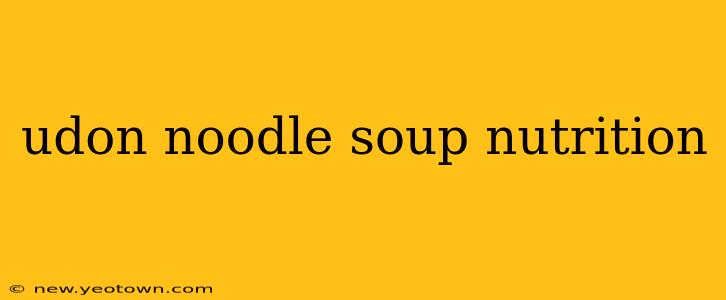Udon Noodle Soup: A Deep Dive into Nutrition and Health Benefits
Udon noodle soup, a comforting and flavorful dish enjoyed across Japan and beyond, is more than just a delicious meal. It offers a surprisingly versatile nutritional profile, adaptable to various dietary needs and preferences. Let's explore the nutritional breakdown of this popular dish, delving into the benefits and considerations for incorporating it into a healthy diet.
Imagine this: a steaming bowl, fragrant with dashi broth, brimming with chewy udon noodles, and perhaps adorned with slices of savory chicken, tender tofu, vibrant vegetables, or a sprinkle of fresh herbs. This seemingly simple dish holds a surprising amount of nutritional complexity.
What are the main ingredients in udon noodle soup?
The foundation of udon noodle soup rests on a few key components:
-
Udon Noodles: These thick wheat flour noodles provide carbohydrates for energy. The nutritional content varies slightly depending on the brand and ingredients, but generally, they offer a decent source of complex carbohydrates, contributing to sustained energy release.
-
Broth: The broth is often dashi-based (kombu kelp and bonito flakes), providing umami flavor and small amounts of protein and minerals. Vegetable broths are also common, offering a lighter, vegetarian option rich in vitamins and minerals.
-
Toppings: This is where the nutritional profile gets really exciting! Toppings can include protein sources like chicken, tofu, shrimp, or eggs; vegetables like mushrooms, spinach, bok choy, carrots, and onions (offering vitamins, minerals, and fiber); and aromatics like scallions and ginger (providing antioxidants and flavor).
How many calories are in a bowl of udon noodle soup?
The calorie count of udon noodle soup is highly variable, depending heavily on the ingredients and portion sizes. A basic bowl with vegetable broth and a moderate amount of noodles might clock in around 300-400 calories. However, adding protein-rich toppings like chicken or shrimp, or opting for a richer broth, can easily increase the calorie count to 500 or more.
Is udon noodle soup healthy?
The healthiness of udon noodle soup depends entirely on the ingredients and preparation method. A well-balanced bowl can be a nutritious part of a healthy diet. The complex carbohydrates from the udon noodles provide sustained energy, while the broth and toppings contribute essential vitamins, minerals, and protein. However, bowls laden with high-fat meats, processed ingredients, or excessive amounts of noodles can be less healthy.
Is udon noodle soup good for weight loss?
Udon noodle soup can be part of a weight-loss plan, but it's crucial to be mindful of portion sizes and ingredient choices. Opting for a broth-based soup with plenty of vegetables and lean protein, while limiting the amount of noodles, is a far healthier approach than a rich, calorie-dense version. The fiber in the vegetables can also contribute to feelings of fullness, potentially aiding in weight management.
What are the benefits of eating udon noodle soup?
The potential benefits of consuming udon noodle soup, when prepared healthily, include:
- Sustained Energy: The complex carbohydrates in the udon noodles provide a slow release of energy.
- Nutrient-Rich: A well-made bowl offers a variety of vitamins and minerals from the vegetables and broth.
- Hydration: The broth contributes to daily fluid intake.
- Dietary Versatility: It can easily be adapted to suit various dietary needs and preferences, including vegetarian, vegan, and gluten-free options (though not with traditional wheat-based udon noodles).
Are there any downsides to eating udon noodle soup?
While generally healthy, some potential downsides include:
- Sodium Content: Broths can be high in sodium, so it's best to opt for low-sodium options or prepare the broth yourself to control the salt content.
- Gluten: Traditional udon noodles contain gluten, making it unsuitable for those with celiac disease or gluten intolerance. Gluten-free alternatives are available.
- Calorie Content: As mentioned, the calorie count can vary considerably depending on the ingredients.
In conclusion, udon noodle soup offers a delicious and potentially nutritious meal. By making conscious choices about ingredients and portion sizes, you can enjoy this comforting dish as part of a healthy and balanced diet. Remember, mindful eating is key to reaping the benefits and minimizing any potential downsides.

